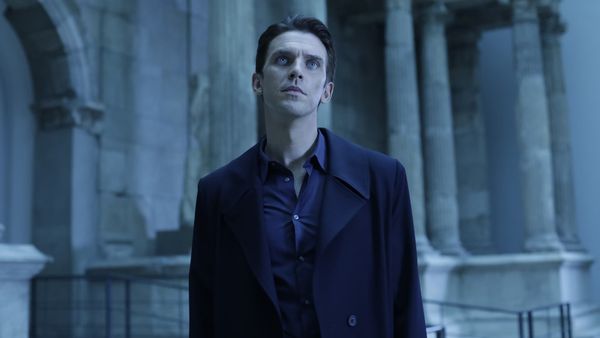Eye For Film >> Movies >> I'm Your Man (2021) Film Review
I'm Your Man
Reviewed by: Jennie Kermode

There is no shortage or writing out there on the potentially solipsistic nature of love, from Immanuel Kant to Simone de Beauvoir to JG Ballard, but to determine whether or not it’s a problem, one has to understand what one is looking for in the first place. Is it love itself that is so attractive, or the idea of it? Oxytocin, dopamine, internally produced opioids – all these things can be generated using stimuli other than another human being, and doing so offers liberation from dependency on unhealthy relationships. But self-sufficiency like this doesn’t deliver for those who want personalised reassurance and affection, somebody to hold them, or arm candy to show off to their friends. At least, it didn’t. Robotic romantic partners are gradually getting more sophisticated. Soon they’ll be indistinguishable from the real thing.
If you keep getting terrible recommendations from Netflix and Facebook pushes products at you that make your skin crawl, the idea of a computer calculating your ideal partner may not sound all that attractive. It’s not something that Alma (Maren Eggert) is too keen on, but for work-related reasons she’s been persuaded to spend three weeks testing a prototype. It’s a role in which she intends to do as little as she can get away with. When Tom (Dan Stevens) tells her that he eyes are like Alpine lakes, she demands improvement. When she takes him home, she immediately shows him to his separate room and closes the door. When she wakes up to find that he has tidied the living room, she panics, and is relieved that he is able to return it to its former state. But Tom is designed to break down her defences, bit by bit. The very fact that she doesn’t want other people to know he’s a robot gives them a shared secret, and it’s all too easy for things to spiral out of control from there.
This might sound like a familiar romantic comedy storyline, but is that really what’s going on here? I’m Your Man, Germany’s official submission to the 2022 Oscars, keeps us guessing. You won’t have to think about it much to recognise the dangers inherent in the situation. Little incidents provide cause for concern. Just who is behind the production of these robots? How have the people receiving them been selected? These questions are not answered directly but, rather, we are gently prompted to consider the possibilities. People like to think that they will never lose control to computers because they can always press the off switch, but if you were in love, would you want to? Could you still imagine it?
With this constant tension in the background, watching Alma grow closer to Tom is bittersweet – not least because she knows the danger. As Tom quietly suggests, however, that’s always a part of the process of falling in love. Their developing romance provides a microcosm for the more widespread romance between humans and technology. It’s complicated by the fact that Alma has also longed for a child, and what is Tom if not a new creation who needs support to find his way in the world? The legacy of Mary Shelley hangs heavy here. Still, the film never surrenders to the urge to be too serious. That’s part of the spell. There is plenty of disarming comedy here, between Alma’s confusion about her feelings and social obligations, and the challenges Tom experiences trying to interact with her and other people.
In many ways Tom comes across like an autistic person trying to cope amongst people with no experience of his type of thinking. He could sail through a Turing test but his intelligence – or what comes across as such – is not always enough to enable him to deal with the complexities of human communication. It’s the oddness this creates that ultimately proves to be his most endearing characteristic. As Francis Bacon noted, there is no excellent beauty that hath not some strangeness in the proportion – perfect people are unapproachable, even boring, but Tom’s inadvertent social awkwardness is the hook that reels Alma (and doubtless many viewers) in.
Director Maria Schrader deftly interweaves a visual style inspired by high end advertising with the comfortable chaos of Alma’s life to date. The performances are top notch. Tom uses the cutesy language of a romcom character and Alma loathes it, like she loathes the way he says “I love you” when they’ve only just met. Who is the real Tom and what does he want? Is there any such person? Alma is haunted by the fundamental loneliness of life. What if, despite herself, she finds herself invested in this relationship only to wake up to the horrifying realisation that she’s been alone all along? Then there’s the question she dare not ask: is the difference between this and other relationships simply the fact that this time she’s going into it with her eyes open?
Reviewed on: 12 Dec 2021















